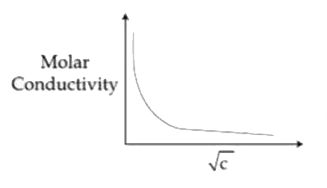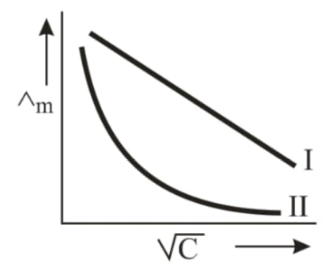Factors affecting the conductivity of an electrolytic solution are
A. distance between the electrodes
B. nature of the electrolyte
C. concentration of electrolyte
D. power of AC source
Choose the correct option given below
A and B only
B and C only
C and D only
A and D only
To determine the factors affecting the conductivity of an electrolytic solution, we need to analyze each of the given options:
1. Distance between the electrodes (A): The distance between the electrodes does not significantly affect the conductivity of the solution itself. Conductivity is more about how well the ions can move through the solution rather than the distance they have to travel between electrodes.
2. Nature of the electrolyte (B): The nature of the electrolyte is indeed a crucial factor. Different electrolytes dissociate into different numbers of ions and types of ions in solution, which directly influences the conductivity. For example, strong electrolytes like NaCl dissociate completely into ions, while weak electrolytes like acetic acid do not, leading to lower conductivity.
3. Concentration of electrolyte (C): The concentration of the electrolyte also significantly affects conductivity. Higher concentrations of ions in solution increase the number of charge carriers, which enhances conductivity. Thus, as the concentration of the electrolyte increases, the conductivity of the solution increases as well.
4. Power of AC source (D): The power of the AC source does not directly affect the conductivity of the solution. Conductivity is a property of the solution itself and is determined by the ions present, not by the source of power used to drive the current.
Based on the analysis, the correct factors affecting the conductivity of an electrolytic solution are:
- B. Nature of the electrolyte
- C. Concentration of electrolyte
Thus, the correct answer is option B and C.
- B. Nature of the electrolyte
- C. Concentration of electrolyte
Topper's Solved these Questions
Similar Questions
Knowledge Check
Molar conductivity of ionic solution depends on……….
1) Temperature
2) Distance between electrodes.
3) Concentration of electrolytes in solution.
4) Surface area of electrodes.A1 & 2B2 & 3C3 & 4D1 & 4For a concentrated solution of a weak electrolyte Ax,By, the degree of dissociation is given as
Aα=√Keq/C(x+y)Bα=√KeqC/(xy)Cα=(Keq/Cx+yxxyy)1/(x+y)Dα=√Keq/xyCElectrolysis is the decomposition of an electrolyte on passing current and it involves the migration of the ions of the electrolyte towards oppositely charged electrodes. Reduction occurs at cathode by the gain of electrons while oxidation at the anode by the loss of electrons. The electrical conductivity of an electrolyte increases upon dilution as well as with the increase in temperature. The nature of the products formed at the respective electrodes depends upon the nature of the electrodes as well as the nature of electrolyte whether in molten state or in aqueous solution. The mass of the substance deposited at a particular electrode is guided by the Faraday's first and second laws of electrolysis.
In and electrolytic cell, one litre of 1 M aqueous solution of MnO4 is reduced at the cathode. The quantity of electricity required, so that the final solution is 0.1 MnO24, will be :A0.1 FB1 FC10 FD100 F
Define limiting molar conductivity. Why does conductivity of an electrolyte decrease with discrease in concentration.
View SolutionThe variation of molar conductivity wih concentration of an electrolyte (X) in aqueous solution is shown in the given figure .

The electrolyte X is :
View Solution
Above plot represents the variation of molar conductance against √C (where C = molar concentration of the electrolyte) . Select the correct option among following .
View SolutionAssertion (A): Molar conductivity of an ionic solution depends on temperature.
Reason (R): Molar conductivity of an ionic solution depends on the concentration of electrolytes in the solution.
View SolutionElectrolysis is the decomposition of an electrolyte on passing current and it involves the migration of the ions of the electrolyte towards oppositely charged electrodes. Reduction occurs at cathode by the gain of electrons while oxidation at the anode by the loss of electrons. The electrical conductivity of an electrolyte increases upon dilution as well as with the increase in temperature. The nature of the products formed at the respective electrodes depends upon the nature of the electrodes as well as the nature of electrolyte whether in molten state or in aqueous solution. The mass of the substance deposited at a particular electrode is guided by the Faraday's first and second laws of electrolysis.
An ion is reduced to an element when it absorbs 6×1020 electrons. The number of equivalents of ion is :
View Solution
